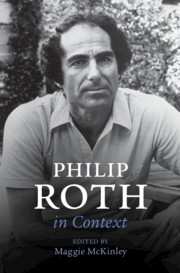Book contents
- Philip Roth in Context
- Philip Roth in Context
- Copyright page
- Contents
- Notes on Contributors
- A Note on References and Abbreviations
- Introduction
- Part I Life and Literary Contexts
- Part II Critical Contexts
- Part III Geographical Contexts
- Part IV Theoretical Contexts
- Chapter 16 Psychoanalysis
- Chapter 17 Postmodernism
- Chapter 18 Trauma Theory
- Chapter 19 Narrative Medicine
- Part V Jewish American Identity
- Part VI Gender and Sexuality
- Part VII Political Contexts
- Part VIII Roth’s Legacy
- Primary Bibliography
- Selected Secondary Bibliography
- Index
Chapter 16 - Psychoanalysis
from Part IV - Theoretical Contexts
Published online by Cambridge University Press: 15 July 2021
- Philip Roth in Context
- Philip Roth in Context
- Copyright page
- Contents
- Notes on Contributors
- A Note on References and Abbreviations
- Introduction
- Part I Life and Literary Contexts
- Part II Critical Contexts
- Part III Geographical Contexts
- Part IV Theoretical Contexts
- Chapter 16 Psychoanalysis
- Chapter 17 Postmodernism
- Chapter 18 Trauma Theory
- Chapter 19 Narrative Medicine
- Part V Jewish American Identity
- Part VI Gender and Sexuality
- Part VII Political Contexts
- Part VIII Roth’s Legacy
- Primary Bibliography
- Selected Secondary Bibliography
- Index
Summary
This chapter addresses the significant place of psychoanalysis in Roth’s life and work, his changing notions of its value, and the way his work contributes significantly to “confessional” literature. Roth himself has admitted the ways that placing his characters in analysis created a kind of stylistic freedom; in Portnoy, the confessional setting allowed him to create “completely unbuttoned” scenarios. While Portnoy’s Complaint is perhaps the most famous example of this, Roth engaged with the “talking cure” as early as 1963 in the short story “The Psychoanalytic Special,” and psychoanalysis figures significantly into novels such as Letting Go, My Life as a Man, Deception, Patrimony, and Sabbath’s Theater. These novels not only illuminate Roth’s fraught relationship with Freudian analysis, but also highlight the connections between Roth’s representations of psychoanalysis and gender, as his protagonists’ anxieties are expressed through an engagement with psychoanalysis.
Information
- Type
- Chapter
- Information
- Philip Roth in Context , pp. 163 - 173Publisher: Cambridge University PressPrint publication year: 2021
